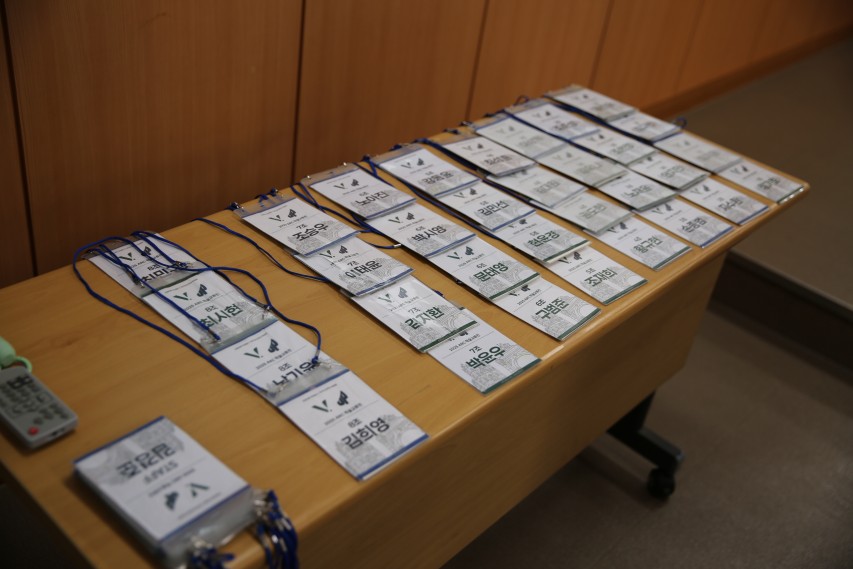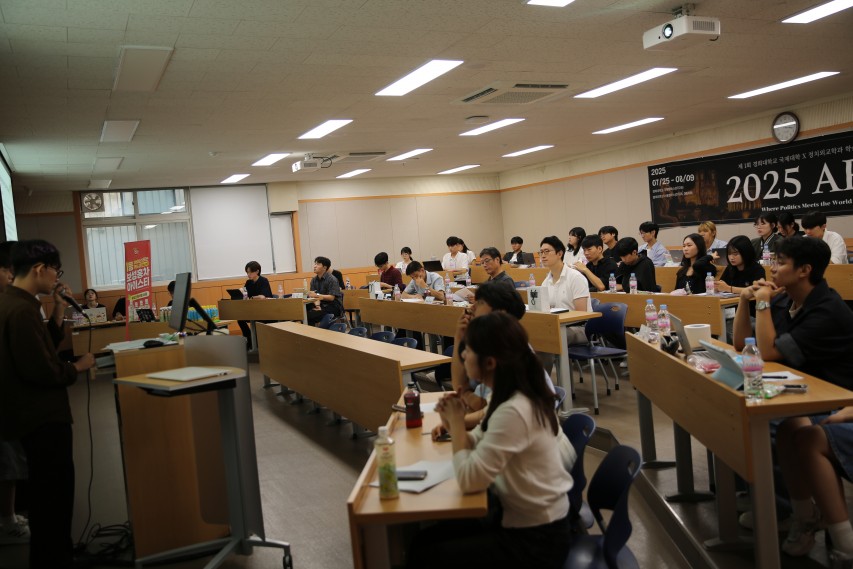[Campus] One Roundtable, Two Campuses: The Spirit of ARC 2025
This summer, students from Kyung Hee University (KHU)’s Seoul and Global campuses came together for “ARC 2025: Where Politics Meets the World”. Hosted by student associations Venture from the College of International Studies and UP from the Dept. of Political Science and International Relations (PSIR), the two-week academic exchange explored international conflicts and peace through student-led discussion.
What Is ARC 2025?
ARC 2025 is a policy hackathon-style exchange program. Students from different majors collaborate to analyze global policy issues, explore alternatives, and develop policy proposals. The name ARC stands for A Roundtable of Change, Conversation, and Collaboration. ARC 2025 follows a roundtable model—open, equal, and discussion-driven. There are no hierarchies or formal speaking orders. Students work side-by-side to build fresh ideas on global issues.
The program ran for two weeks. It began with in-person activities at both Seoul and Global Campuses from July 25 to 26. Teams then participated in an interim review on August 4, followed by a final presentation and award ceremony on August 9. Throughout the program, teams were free to develop their own conclusions on the assigned topics.
ARC 2025 brought together the strengths of political science and international studies to tackle global, not just domestic, issues. Yoo Hyun-ji, a planning supervisor from UP, said the policy hackathon format, already familiar to PSIR students, was ideal for developing clear, actionable proposals. “Using the format for international topics helped participants develop policy ideas that were both well-researched and realistic,” she said.
Park Yun-seung, a planning supervisor from Venture, explained that the event’s energy came from the students themselves. “Keeping everyone engaged was our top priority throughout the program,” he said, adding that regular check-ins and close team monitoring ensured progress. “Contrary to our concerns, every participant stayed committed and delivered strong results.” He mentioned that one team voluntarily met in-person about four times outside of the official schedule to continue discussions.
Organizers emphasized that ARC 2025 was designed to merge the strengths of political science and international studies. This vision was reflected in the students’ projects. Kim Ji-hwan, a student from the Dept. of International Studies, shared that his team analyzed the limitations of the World Trade Organization’s Trade Policy Review system and proposed the creation of a Free Trade Index. “The differences in both majors actually helped us form a more balanced perspective,” he said. “As a result, we produced a policy proposal that was both persuasive and credible.”
ARC 2025 name tags with group designations
Courtesy of Venture and UP
Students in Action and On-the-ground Work
The event brought together 32 students across eight teams, mixing 17 PSIR and 15 International Studies students. The first day featured team-building and networking activities. The next day, teams drew subtopics and held three-hour seminars to set project directions and goals.
Noh A-jin, a student from the Dept. of PSIR, described the exchange with Global Campus students as a refreshing and rare chance to collaborate across campuses. Working with peers skilled in English and international affairs inspired her to improve her own skills and knowledge. Kim also described the program as a meaningful opportunity to connect with students from different majors. "Learning data visualization skills from teammates of PSIR was a valuable experience that strengthened my collaboration," he added.
Each team was assigned one of four global challenges: technology hegemony and supply chain restructuring, international organizations and peace diplomacy, the legitimacy of humanitarian intervention, or artificial intelligence (AI) governance through international agreements. They were also given one of two opposing positions to defend. This format encouraged participants to explore the assigned issue from a specific perspective and develop a concrete policy proposal.
“Our team worked on AI governance through international agreements,” said Noh. “We took the position that AI treaties can be effective and that the international community can cooperate to regulate AI.” She added that, “While the stance was somewhat idealistic, we worked to identify key issues and shape them into realistic policy proposals.”
On August 4, teams received feedback from a mentor with the United Nations Development Programme. Yoo said, “The check-in allowed many teams to adjust their approach. Some even made complete changes after the feedback.” Park added, “The mentor listened to the students’ opinions and praised their unexpected approaches, making it a time of healthy mutual feedback.”
Students participating in the final presentation session
Courtesy of Venture and UP
Final Presentations and New Possibilities
The final presentations on August 9 showcased two weeks of dedicated work. Following the presentations, faculty members provided detailed feedback. A team-to-team question & answer session followed, creating space for open dialogue and the exchange of diverse academic perspectives.
Park said he hopes ARC will grow into a signature academic exchange event at KHU—one that connects students across departments through shared inquiry and collaboration. He recalled a standout moment from the second day of the program: the three-hour team seminar. “I was worried because it had to be driven solely by students themselves, but seeing everyone concentrate on research, engage in passionate debates, and share their background knowledge was both satisfying and impressive,” he said.
Yoo also mentioned that the students asked a wide range of questions. She felt proud seeing traces of thoughtful deliberations—particularly during the three-hour team seminar on the second day, where one group explored three different directions within a short timeframe, and in the students who persistently raised questions throughout the process.
As a cross-campus academic exchange event, ARC 2025 provided a meaningful experience for participants from both campuses. It showed what is possible when academic exchange breaks past disciplinary boundaries. With ARC 2025 as a starting point, organizers hope to spark even more collaboration and dialogue across the University.
There are no registered comments.
I agree to the collection of personal information. [view]



